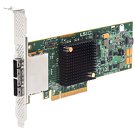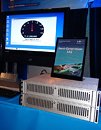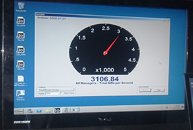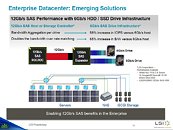- Joined
- Oct 9, 2007
- Messages
- 47,233 (7.55/day)
- Location
- Hyderabad, India
| System Name | RBMK-1000 |
|---|---|
| Processor | AMD Ryzen 7 5700G |
| Motherboard | ASUS ROG Strix B450-E Gaming |
| Cooling | DeepCool Gammax L240 V2 |
| Memory | 2x 8GB G.Skill Sniper X |
| Video Card(s) | Palit GeForce RTX 2080 SUPER GameRock |
| Storage | Western Digital Black NVMe 512GB |
| Display(s) | BenQ 1440p 60 Hz 27-inch |
| Case | Corsair Carbide 100R |
| Audio Device(s) | ASUS SupremeFX S1220A |
| Power Supply | Cooler Master MWE Gold 650W |
| Mouse | ASUS ROG Strix Impact |
| Keyboard | Gamdias Hermes E2 |
| Software | Windows 11 Pro |
LSI corporation is the first to implement new serial-attached SCSI (SAS) 12 Gb/s interface, geared for future generations of storage devices that can make use of that much bandwidth. For now, LSI proposes SAS expander chips that distribute that bandwidth among current-generation storage devices. The company displayed the world's first SATA 12 Gb/s add-on card, which uses PCI-Express 3.0 x8 interface to make sure there's enough system bus bandwidth. This card can connect to up to 44 SAS or SATA devices, and supports up to 2048 SAS addresses. It is backwards compatible with today's 6 Gb/s and 3 Gb/s devices.
By making use of the 12 Gb/s SAS Expander solution paired with 32 current-generation Seagate Savvio 15.3K RPM hard drives, LSI claims 58% increase in IOPS compared to a 6 Gb/s host controller, because of better bandwidth aggregation per drive. There's also a 68% increase in bandwidth yield. The array of 32 hard drives could dole out 3106.84 MB/s on IOMeter, and more significantly, over 1.01 million IOPS. As big as this number seems, it could be an IOMeter bug, because the numbers don't add up. Perhaps it's measuring IOPS from disk caches.




View at TechPowerUp Main Site
By making use of the 12 Gb/s SAS Expander solution paired with 32 current-generation Seagate Savvio 15.3K RPM hard drives, LSI claims 58% increase in IOPS compared to a 6 Gb/s host controller, because of better bandwidth aggregation per drive. There's also a 68% increase in bandwidth yield. The array of 32 hard drives could dole out 3106.84 MB/s on IOMeter, and more significantly, over 1.01 million IOPS. As big as this number seems, it could be an IOMeter bug, because the numbers don't add up. Perhaps it's measuring IOPS from disk caches.




View at TechPowerUp Main Site
Last edited:










